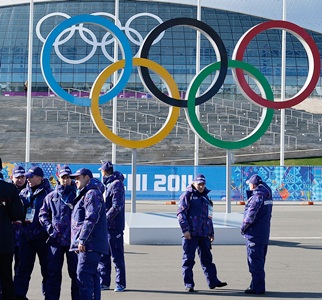 Intelligence agencies believe attacks by militants during the Sochi Winter Olympics are highly likely, but will probably be aimed at "softer" targets elsewhere in Russia, such as public transportation or other civilian venues, US and European officials said.
Intelligence agencies believe attacks by militants during the Sochi Winter Olympics are highly likely, but will probably be aimed at "softer" targets elsewhere in Russia, such as public transportation or other civilian venues, US and European officials said.
Several US and European security officials said that last-minute intelligence reports about possible Olympics-related attacks have continued to flow into Western agencies and that US and European agencies take them very seriously.
"I'm more concerned now than a week ago," one US official said on Thursday. He said there are multiple militant groups who have indicated they intend to carry out attacks during the Games. The official and other officials spoke on condition of anonymity because of the sensitivity of the subject.
The US official added that, while security at the Olympic venues is formidable, there are potential soft targets not far outside the Olympic perimeter where militants might be able to attack, attracting huge media coverage.
At a hearing before the House Intelligence Committee earlier this week, Matthew Olsen, director of the NationalCounterterrorismCenter said, "We think the ... greater danger from a terrorist perspective is in potential for attacks to occur outside of the actual venues of the games themselves in the area surrounding Sochi or outside of Sochi in the region."
Other officials said the Russian capitol, Moscow, could be high on militants lists' of potential targets.
In a sign of heightened concern, the US Transportation Security Administration (TSA) is temporarily banning all liquids, aerosols, gels and powders in carry-on luggage on flights between Russia and the United States, a US Department of Homeland Security official said on Thursday.
"As always, our security posture, which at all times includes a number of measures both seen and unseen, will continue to respond and appropriately adapt to protect the American people from an ever evolving threat picture," the official said.
Delta Airlines posted a statement on its website saying that Russia-bound passengers would still be able to place liquids, gels, aerosols and powders in checked baggage. However, passengers headed to Russia will be required to check in personally with a Delta agent at the airport and will not be able to use automatic or online check-in facilities.
Some US officials on Thursday played down the significance of a disclosure that the US Department of Homeland Security had warned airlines to be on guard for toothpaste containers that could contain bomb-making ingredients.
Officials confirmed the warning had been issued. But several officials said that it was based on intelligence that was collected some time ago and that little, if any, new information had surfaced to confirm that any toothpaste plot related to Sochi was in progress.
Sill, US and European security officials said multiple militant elements pose significant and current Olympic-related threats.
The main threat, said both European and US officials, is posed by the Caucasus-based Imarat Kavkaz movement, which has attacked a Moscow airport and the capital's subway system. Officials said they could not confirm rumours that the group's leader, Doku Umarov, who last July called on his followers to disrupt the Olympics, had been killed.
Even if Umarov is dead, security officials believe the group is decentralized and its commanders are sufficiently autonomous to carry out attacks on their own.
Some officials said that attacks could also be attempted by "lone wolf" militants or returnees who had been fighting with militant factions in Syria. But such attacks are thought less likely.
Laith Alkhouri of Flashpoint Partners, a private firm which monitors militant websites for government and private customers, noted that militants have had "months and months to plan" Olympic-related attacks.
"Although the Russian government was also preparing for the games all this time, many of its security measures were ad hoc and reactionary, which might be a point of weakness in their security design," he said.
Alkhouri also said Russian security forces had recently stepped up their operations in the Caucasus, most notably in Dagestan, a militant hotbed. He added, however, that "the Caucasus militants are security-cautious, tech-savvy, highly motivated, and cannot be profiled easily."
Image: Security personnel walk past the Olympic Rings ahead of the Sochi 2014 Winter Olympics at the Olympic Park
Photograph: Pascal Le Segretain/Getty Images











 © 2025
© 2025